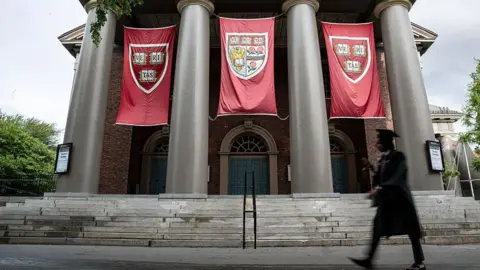In recent developments, the Trump administration has launched a significant initiative aimed at potentially pulling an estimated $100 million in funding from Harvard University, marking a notable escalation in the ongoing conflict between the White House and the prestigious institution. This directive comes as part of a broader strategy to review federal contracts and grants, specifically those associated with Harvard, as the administration seeks to exert pressure on the university amidst accusations of discrimination and antisemitism.
The plan involves the Government Services Administration (GSA) circulating a letter to various federal agencies, requesting them to identify any existing contracts with Harvard. Agencies will evaluate these contracts to determine if they can either be canceled or redirected to other entities. Senior White House officials estimate that approximately 30 contracts, collectively valued at $100 million, are subject to this review. This announcement follows a previous imposition by the administration in which around $2.2 billion in federal grants to Harvard were frozen, alongside a restriction on the university’s ability to enroll international students.
In response to this initiative, a spokesperson from Harvard University refrained from providing immediate comments. However, the university’s website emphasizes its reliance on federal support for crucial research initiatives, which span a wide array of health concerns, including cancer, heart disease, infectious diseases, and obesity. Harvard underscores the detrimental impact that the loss of federal funding would have on ongoing projects, cautioning that such cuts could stymie critical research efforts that benefit both the institution and the wider society.
The review process initiated by the White House will not result in automatic cuts but serves as an examination of the funding Harvard receives from the federal government to assess its importance according to the administration’s perspective. Each agency will have the autonomy to recommend terminations of contracts that do not meet established standards. A letter drafted by the administration details accusations against Harvard, suggesting that the university’s actions justify this funding reevaluation.
Interestingly, administration officials have clarified that potential cuts will not extend to hospitals affiliated with Harvard University. Moreover, if a federal grant is deemed vital to an agency’s operations, there could be an opportunity for that agency to advocate for continued funding. This complex interplay of policy and funding marks a notable moment in the ongoing political and legal tussle between the Trump administration and Harvard, a relationship that has intensified over the previous months.
The Trump administration’s attempts to curtail Harvard’s funding are not unprecedented. Earlier this year, the White House froze $2.2 billion in federal funding, prompting the university to pursue legal action in response. The administration’s controversial decision to revoke Harvard’s capacity to enroll international students has further complicated the situation, resulting in significant uncertainty for affected students and subsequent legal inquiries initiated by Harvard.
As Harvard University’s president, Alan Garber, poignantly articulated, the ramifications of cutting research funding extend beyond the university itself. The funding provided to institutions is crucial for executing research projects aligned with national priorities, reinforcing the expectation that work designated as high-priority by the federal government will continue unimpeded.
One area significantly impacted by these funding challenges is the Sinclair Lab located within Harvard Medical School, which focuses on aging research and the potential development of treatments for a plethora of ailments, including Alzheimer’s disease and cancer. Researchers at the lab have expressed concerns regarding the cessation of funding, stating that halting research not only disrupts ongoing experiments but could also hinder the contributions of international scholars, who are integral to the lab’s success.
The consequences of these funding cuts could profoundly affect graduate and doctoral students, many of whom depend on external funding for their work. Adam Nguyen, a Harvard alumnus, noted that such cuts might result in layoffs and halt projects that many students have devoted themselves to. This sentiment underscores the critical need for sustained financial support for research initiatives in higher education institutions, particularly those that advance broader societal goals.
As this situation evolves, it is clear that the intersection of politics, funding, and education will continue to play a pivotal role in shaping the academic landscape for institutions like Harvard University.



